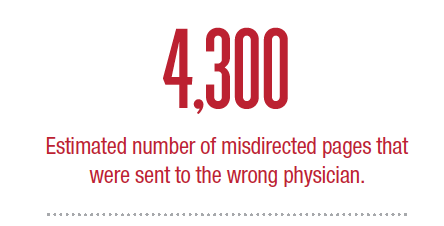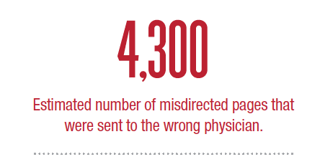Pulsara Around the World - February 2026
January Recap The start of 2026 was on the slow side for our events schedule, with our team heading to the Florida Fire & EMS Conference, the...
2 min read
 James Woodson, MD
:
Aug 10, 2017
James Woodson, MD
:
Aug 10, 2017

Researchers find a significant number of communication failures at hospitals. Could they be contributing to preventable patient deaths and disability?
A study in Toronto found that over a two-month period, 14 percent of all pages went to the wrong physician and nearly half of those were emergent or urgent communications.
 A study that examined communication failures at Sunnybrook Health Sciences Centre and the Toronto General Hospital in Toronto, Canada, found that over a two-month period, 14 percent of pages were sent to the wrong physician.[12] That’s an estimated 4,300 misdirected pages each year—half of which are related to emergency or urgent matters.
A study that examined communication failures at Sunnybrook Health Sciences Centre and the Toronto General Hospital in Toronto, Canada, found that over a two-month period, 14 percent of pages were sent to the wrong physician.[12] That’s an estimated 4,300 misdirected pages each year—half of which are related to emergency or urgent matters.
While these findings are alarming, they may just be the tip of the iceberg. The researchers based their estimates on the number of times off-duty physicians were paged, which may be an underestimate of total errant pages sent. These pages that were sent to the wrong doctor can result in significant delays to patient care.
At the two Toronto hospitals studied, health professionals relied on paper-based schedules to determine which physician to page. These outdated systems using paper can make it difficult to keep schedules up to date and are not responsive in real-time to scheduling changes. Furthermore, these systems provide no systematic feedback loop when errant pages are sent to the wrong person.
Mobile-based team communication can provide solutions to the types of communication errors and delays experienced by the hospitals study by:
Offering exceptional patient care and achieving good outcomes in difficult and emergent cases is enough of a challenge for health professionals. They shouldn’t also have to worry about whether the call schedule is up-to-date, a page went through or the specialist is headed to the hospital. Smarter, mobile-based communication systems can help solve these problems and make it easier to quickly and transparently communicate with the right people, which ultimately leads to better patient care.
REFERENCES:
12. Wong BM, et al. Frequency and Clinical Importance of Pages Sent to the Wrong Physician. Arch Intern Med. 2009;169(11):1069-1081.

January Recap The start of 2026 was on the slow side for our events schedule, with our team heading to the Florida Fire & EMS Conference, the...

Recent research shows how Pulsara was successfully leveraged to connect more than 6,000 COVID-19 patients to monoclonal antibody infusion centers via...

At Pulsara, it's our privilege to help serve the people who serve people, and we're always excited to see what they're up to. From large-scale...